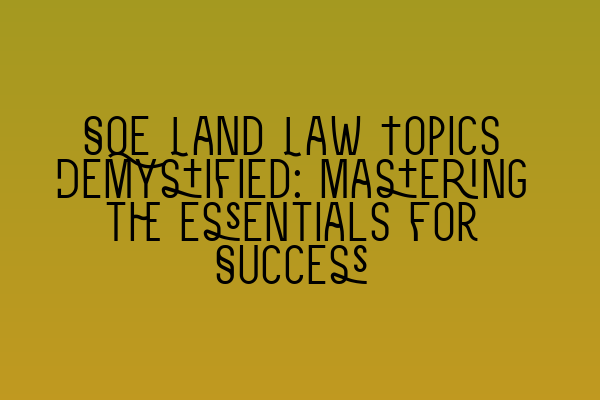SQE Land Law Topics Demystified: Mastering the Essentials for Success
Are you preparing for the Solicitors Qualifying Exam (SQE) and feeling overwhelmed by the vast array of land law topics you need to master? Don’t worry, we’ve got you covered! In this comprehensive guide, we will demystify the essential land law topics that you need to understand for success in your SQE exams.
Before we dive into the specifics, it’s important to note that land law is a fundamental area of legal practice, particularly in property transactions. As a solicitor specializing in property law, having a solid understanding of land law is crucial to provide effective legal advice and services to clients.
The Essentials of Land Law
1. Freehold and Leasehold: Understanding the difference between freehold and leasehold land is essential. Freehold land refers to land that is owned outright, without any time restrictions. On the other hand, leasehold land involves a lease agreement that grants exclusive possession for a specific period.
2. Legal and Equitable Interests: In land law, there are two types of interests: legal and equitable. Legal interests are enforceable by law, while equitable interests are based on fairness and can be enforced in equity. It’s crucial to understand the distinctions between these interests.
3. Registered and Unregistered Land: Knowing the difference between registered and unregistered land is vital. Registered land is documented in the Land Registry, providing a clear and conclusive record of ownership. Unregistered land, on the other hand, doesn’t have a registered title and requires different methods of proof.
4. Co-ownership: Understanding the principles of co-ownership is essential, as it deals with the rights and obligations of multiple individuals or entities owning the same property. This area involves concepts such as joint tenancy, tenancy in common, and the rights of survivorship.
5. Easements and Covenants: Easements are rights over land that benefit another person or property, such as a right of way. Covenants, on the other hand, are promises made between parties regarding the use or restriction of land. Familiarize yourself with the different types of easements and covenants.
6. Mortgages: Mortgages are essential in property transactions, and understanding how they work is crucial. Be knowledgeable about the different types of mortgages, the rights and obligations of mortgagees and mortgagors, and the process of foreclosure or repossession.
Now that we’ve covered the essentials, it’s time to put your knowledge into practice. Check out our SQE 1 Practice Exam Questions to test your understanding of these land law topics. These practice questions will help you familiarize yourself with the format and content of the exam.
Preparing for Success in SQE Land Law Exams
Effective preparation is key to succeed in your SQE land law exams. Here are some recommended steps to enhance your chances of success:
1. Enroll in a comprehensive SQE 2 preparation course that covers all the essential land law topics. These courses are designed to provide you with a structured and thorough understanding of the subject matter.
2. Incorporate regular revision into your study routine. Break down the land law topics into manageable sections and spend dedicated time revising each one. Use flashcards, mnemonic devices, or diagrams to aid your memorization and understanding.
3. Practice past exam questions, such as our SQE 1 Practice Mocks FLK1 FLK2 to familiarize yourself with the exam format and timing. This will help you identify any areas of weakness and improve your exam technique.
4. Stay updated with the latest changes in land law by regularly referring to reliable legal resources. Keep an eye on new cases, legislation, and commentary in this area to ensure your knowledge is up-to-date and accurate.
Lastly, it’s crucial to stay informed about important dates and deadlines for the SRA SQE examinations. Visit our website for the latest SRA SQE Exam Dates and make sure you plan your preparation accordingly.
Conclusion
Gaining a solid understanding of land law is essential for success in your SQE examinations and your future legal career. By mastering the essentials, such as freehold and leasehold, legal and equitable interests, registered and unregistered land, co-ownership, easements and covenants, and mortgages, you’ll be well-prepared to tackle any land law question that comes your way.
Remember, effective preparation is key. Enroll in a comprehensive SQE preparation course, practice past exam questions, and stay updated with the latest developments in land law. By following these steps, you’ll be on your way to mastering land law and achieving success in your SQE exams!
